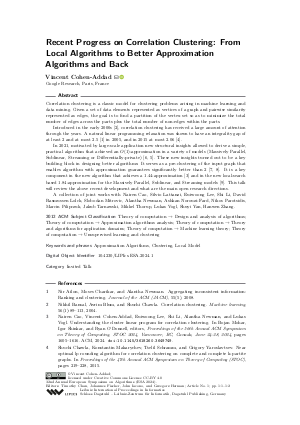Recent Progress on Correlation Clustering: From Local Algorithms to Better Approximation Algorithms and Back (Invited Talk)
Author
Vincent Cohen-Addad 
-
Part of:
Volume:
32nd Annual European Symposium on Algorithms (ESA 2024)
Part of: Series: Leibniz International Proceedings in Informatics (LIPIcs)
Part of: Conference: European Symposium on Algorithms (ESA) - License:
 Creative Commons Attribution 4.0 International license
Creative Commons Attribution 4.0 International license
- Publication Date: 2024-09-23
File

PDF
LIPIcs.ESA.2024.1.pdf
- Filesize: 386 kB
- 2 pages
Document Identifiers
Subject Classification
ACM Subject Classification
- Theory of computation → Design and analysis of algorithms
- Theory of computation → Approximation algorithms analysis
- Theory of computation → Theory and algorithms for application domains
- Theory of computation → Machine learning theory
- Theory of computation → Unsupervised learning and clustering
Keywords
- Approximation Algorithms
- Clustering
- Local Model
Metrics
- Access Statistics
-
Total Accesses (updated on a weekly basis)
0PDF Downloads0Metadata Views
Abstract
Correlation clustering is a classic model for clustering problems arising in machine learning and data mining. Given a set of data elements represented as vertices of a graph and pairwise similarity represented as edges, the goal is to find a partition of the vertex set so as to minimize the total number of edges across the parts plus the total number of non-edges within the parts.
Introduced in the early 2000s [Bansal et al., 2004], correlation clustering has received a large amount of attention through the years. A natural linear programming relaxation was shown to have an integrality gap of at least 2 and at most 2.5 [Ailon et al., 2008] in 2005, and in 2015 at most 2.06 [Chawla et al., 2015].
In 2021, motivated by large-scale application new structural insights allowed to derive a simple, practical algorithm that achieved an O(1)-approximation in a variety of models (Massively Parallel, Sublinear, Streaming or Differentially-private) [Vincent Cohen{-}Addad et al., 2021; Cohen-Addad et al., 2022]. These new insights turned out to be a key building block in designing better algorithms: It serves as a pre-clustering of the input graph that enables algorithm with approximation guarantees significantly better than 2 [Vincent Cohen{-}Addad et al., 2023; Vincent Cohen{-}Addad et al., 2022]. It is a key component in the new algorithm that achieves a 1.44-approximation [Nairen Cao et al., 2024] and in the new local-search based 1.84-approximation for the Massively Parallel, Sublinear, and Streaming models [Vincent Cohen{-}Addad et al., 2024]. This talk will review the above recent development and what are the main open research directions.
A collection of joint works with Nairen Cao, Silvio Lattanzi, Euiwoong Lee, Shi Li, David Rasmussen Lolck, Slobodan Mitrovic, Alantha Newman, Ashkan Norouzi-Fard, Nikos Parotsidis, Marcin Pilipczuk, Jakub Tarnawski, Mikkel Thorup, Lukas Vogl, Shuyi Yan, Hanwen Zhang.
Cite As Get BibTex
Vincent Cohen-Addad. Recent Progress on Correlation Clustering: From Local Algorithms to Better Approximation Algorithms and Back (Invited Talk). In 32nd Annual European Symposium on Algorithms (ESA 2024). Leibniz International Proceedings in Informatics (LIPIcs), Volume 308, pp. 1:1-1:2, Schloss Dagstuhl – Leibniz-Zentrum für Informatik (2024)
https://doi.org/10.4230/LIPIcs.ESA.2024.1
BibTex
@InProceedings{cohenaddad:LIPIcs.ESA.2024.1,
author = {Cohen-Addad, Vincent},
title = {{Recent Progress on Correlation Clustering: From Local Algorithms to Better Approximation Algorithms and Back}},
booktitle = {32nd Annual European Symposium on Algorithms (ESA 2024)},
pages = {1:1--1:2},
series = {Leibniz International Proceedings in Informatics (LIPIcs)},
ISBN = {978-3-95977-338-6},
ISSN = {1868-8969},
year = {2024},
volume = {308},
editor = {Chan, Timothy and Fischer, Johannes and Iacono, John and Herman, Grzegorz},
publisher = {Schloss Dagstuhl -- Leibniz-Zentrum f{\"u}r Informatik},
address = {Dagstuhl, Germany},
URL = {https://drops.dagstuhl.de/entities/document/10.4230/LIPIcs.ESA.2024.1},
URN = {urn:nbn:de:0030-drops-210728},
doi = {10.4230/LIPIcs.ESA.2024.1},
annote = {Keywords: Approximation Algorithms, Clustering, Local Model}
}
Author Details
References
-
Nir Ailon, Moses Charikar, and Alantha Newman. Aggregating inconsistent information: Ranking and clustering. Journal of the ACM (JACM), 55(5), 2008.

-
Nikhil Bansal, Avrim Blum, and Shuchi Chawla. Correlation clustering. Machine learning, 56(1):89-113, 2004.

- Nairen Cao, Vincent Cohen-Addad, Euiwoong Lee, Shi Li, Alantha Newman, and Lukas Vogl. Understanding the cluster linear program for correlation clustering. In Bojan Mohar, Igor Shinkar, and Ryan O'Donnell, editors, Proceedings of the 56th Annual ACM Symposium on Theory of Computing, STOC 2024, Vancouver, BC, Canada, June 24-28, 2024, pages 1605-1616. ACM, 2024. URL: https://doi.org/10.1145/3618260.3649749.
-
Shuchi Chawla, Konstantin Makarychev, Tselil Schramm, and Grigory Yaroslavtsev. Near optimal lp rounding algorithm for correlation clustering on complete and complete k-partite graphs. In Proceedings of the 47th Annual ACM Symposium on Theory of Computing (STOC), pages 219-228, 2015.

- Vincent Cohen-Addad, Chenglin Fan, Silvio Lattanzi, Slobodan Mitrovic, Ashkan Norouzi-Fard, Nikos Parotsidis, and Jakub M Tarnawski. Near-optimal correlation clustering with privacy. In S. Koyejo, S. Mohamed, A. Agarwal, D. Belgrave, K. Cho, and A. Oh, editors, Advances in Neural Information Processing Systems, volume 35, pages 33702-33715. Curran Associates, Inc., 2022. URL: https://proceedings.neurips.cc/paper_files/paper/2022/file/da645920dcd3bd35b0dae329894bad80-Paper-Conference.pdf.
-
Vincent Cohen-Addad, Silvio Lattanzi, Slobodan Mitrovic, Ashkan Norouzi-Fard, Nikos Parotsidis, and Jakub Tarnawski. Correlation clustering in constant many parallel rounds. In Proceedings of the 38th International Conference on Machine Learning (ICML), volume 139, pages 2069-2078, 2021.

- Vincent Cohen-Addad, Euiwoong Lee, Shi Li, and Alantha Newman. Handling correlated rounding error via preclustering: A 1.73-approximation for correlation clustering. In 64th IEEE Annual Symposium on Foundations of Computer Science, FOCS 2023, Santa Cruz, CA, USA, November 6-9, 2023, pages 1082-1104. IEEE, 2023. URL: https://doi.org/10.1109/FOCS57990.2023.00065.
- Vincent Cohen-Addad, Euiwoong Lee, and Alantha Newman. Correlation clustering with sherali-adams. In 63rd IEEE Annual Symposium on Foundations of Computer Science, FOCS 2022, Denver, CO, USA, October 31 - November 3, 2022, pages 651-661. IEEE, 2022. URL: https://doi.org/10.1109/FOCS54457.2022.00068.
- Vincent Cohen-Addad, David Rasmussen Lolck, Marcin Pilipczuk, Mikkel Thorup, Shuyi Yan, and Hanwen Zhang. Combinatorial correlation clustering. In Bojan Mohar, Igor Shinkar, and Ryan O'Donnell, editors, Proceedings of the 56th Annual ACM Symposium on Theory of Computing, STOC 2024, Vancouver, BC, Canada, June 24-28, 2024, pages 1617-1628. ACM, 2024. URL: https://doi.org/10.1145/3618260.3649712.
